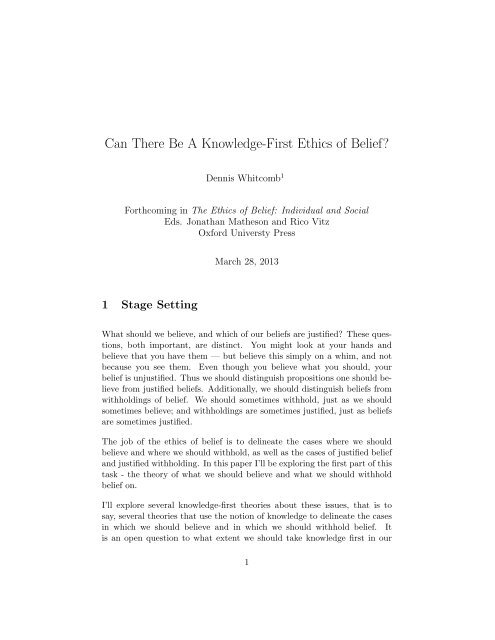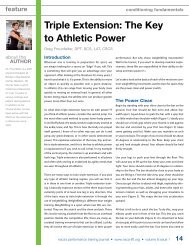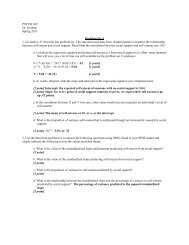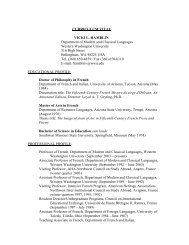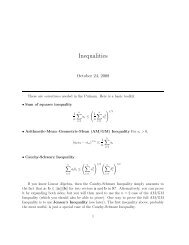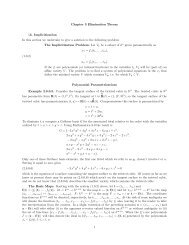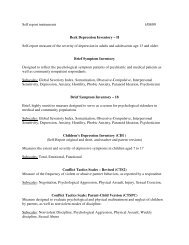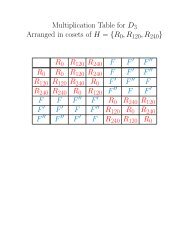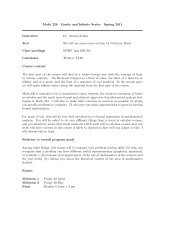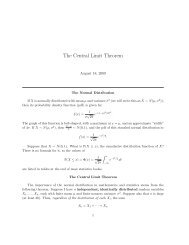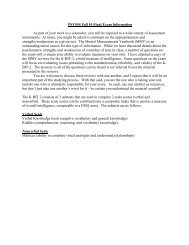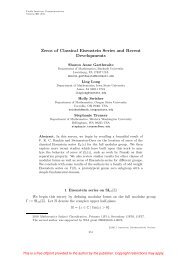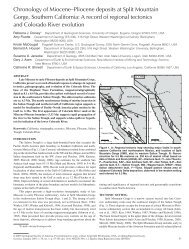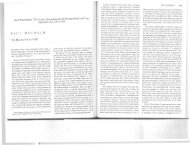Can There Be A Knowledge-First Ethics of Belief? - Western ...
Can There Be A Knowledge-First Ethics of Belief? - Western ...
Can There Be A Knowledge-First Ethics of Belief? - Western ...
Create successful ePaper yourself
Turn your PDF publications into a flip-book with our unique Google optimized e-Paper software.
<strong>Can</strong> <strong>There</strong> <strong>Be</strong> A <strong>Knowledge</strong>-<strong>First</strong> <strong>Ethics</strong> <strong>of</strong> <strong>Be</strong>lief?<br />
Dennis Whitcomb 1<br />
Forthcoming in The <strong>Ethics</strong> <strong>of</strong> <strong>Be</strong>lief: Individual and Social<br />
Eds. Jonathan Matheson and Rico Vitz<br />
Oxford Universty Press<br />
March 28, 2013<br />
1 Stage Setting<br />
What should we believe, and which <strong>of</strong> our beliefs are justified? These questions,<br />
both important, are distinct. You might look at your hands and<br />
believe that you have them — but believe this simply on a whim, and not<br />
because you see them. Even though you believe what you should, your<br />
belief is unjustified. Thus we should distinguish propositions one should believe<br />
from justified beliefs. Additionally, we should distinguish beliefs from<br />
withholdings <strong>of</strong> belief. We should sometimes withhold, just as we should<br />
sometimes believe; and withholdings are sometimes justified, just as beliefs<br />
are sometimes justified.<br />
The job <strong>of</strong> the ethics <strong>of</strong> belief is to delineate the cases where we should<br />
believe and where we should withhold, as well as the cases <strong>of</strong> justified belief<br />
and justified withholding. In this paper I’ll be exploring the first part <strong>of</strong> this<br />
task - the theory <strong>of</strong> what we should believe and what we should withhold<br />
belief on.<br />
I’ll explore several knowledge-first theories about these issues, that is to<br />
say, several theories that use the notion <strong>of</strong> knowledge to delineate the cases<br />
in which we should believe and in which we should withhold belief. It<br />
is an open question to what extent we should take knowledge first in our<br />
1
epistemological theorizing. If a knowledge-first theory <strong>of</strong> what we should<br />
believe (and what we should withhold belief on) can be made to work, then<br />
that is some reason to adopt the knowledge-first approach to epistemology<br />
as a whole. If no such theory can be made to work, then that is some reason<br />
to reject the knowledge-first approach to epistemology as a whole.<br />
I won’t converge on a view about which one <strong>of</strong> these two options is correct.<br />
Instead, I will explore the problems and prospects <strong>of</strong> the approach. The<br />
exploration will proceed via closely engaging numerous attempts to build the<br />
knowledge-first theories in question. Most <strong>of</strong> those attempts don’t work, for<br />
reasons I will bring out. Others might work, depending on how their details<br />
end up; this too I will bring out.<br />
When I inquire into what we should believe, I mean to ask that question<br />
in a specifically epistemic sense. To get a fix on this sense, put yourself in<br />
the position <strong>of</strong> an undergraduate who has just learned about Pascal’s wager.<br />
Imagine you have the following common reaction to the wager: “OK, sure,<br />
that shows that believing in God serves my interests. But when I asked<br />
whether I should believe in God, I didn’t want to know whether that belief<br />
would serve my interests. I wanted to know something else.....” Undergraduates<br />
regularly have this reaction to Pascal’s wager. And they are regularly<br />
relieved to be told that there is a particular thing they are looking for: epistemic<br />
(as opposed to practical) reasons to believe in God, and in particular<br />
epistemic reasons strong enough that they should, from an epistemic point<br />
<strong>of</strong> view, believe. It is the particular “should” delineated here, that I focus<br />
on in the current paper. It is the epistemic should.<br />
If you are inclined to deny the existence <strong>of</strong> this “epistemic” should, then<br />
think about it this way instead. <strong>There</strong> is such a thing as propositional<br />
justification. To have propositional justification to believe a proposition is<br />
to have good enough epistemic reason to believe it. Similarly, to have good<br />
enough propositional justification to withhold on a proposition, is to have<br />
good enough epistemic reason to withhold on it. What we should believe,<br />
in my sense - what I am calling the epistemic sense - is just what we have<br />
propositional justification to believe. Similarly, what we should withhold<br />
belief on - in the epistemic sense - is what we have propositional justification<br />
to withhold belief on.<br />
In the terminology <strong>of</strong> “propositional justification”, then, the current paper<br />
is searching after a knowledge-first theory <strong>of</strong> what we are propositionally<br />
2
justified to believe and withhold belief on. To my ear, “should believe” talk<br />
expresses the same issues more naturally than “propositional justification”<br />
talk, and so I will stick to the former.<br />
2 Identity Theories<br />
Our task is to build a knowledge-first theory <strong>of</strong> what we should believe<br />
and what we should withhold belief on. The most straightforward way to<br />
discharge this task is to simply identify what we should believe with what we<br />
know. Timothy Williamson comes close to advocating such an identification<br />
in the following passage:<br />
. . . the fundamental rule <strong>of</strong> assertion is that one should assert<br />
p only if one knows p. . . more speculatively, we may project the<br />
account <strong>of</strong> assertion back on to its mental counterpart, judgment<br />
(or belief). What results is the rule that one should judge (or<br />
believe p) only if one knows p. 2<br />
Similarly, Jonathan Sutton argues at length that<br />
One must: believe p only if one knows p. 3<br />
Notice the colon after the “must”. It’s important; it specifies that the “must”<br />
has wide scope ranging over the entire rest <strong>of</strong> the sentence. Contrast this<br />
wide-scope view with<br />
One must believe p only if: one knows p.<br />
This view gives the “must” narrow scope ranging only over “believe p”.<br />
To start to see the differences between the two views, consider the moral<br />
principle “you should, if you kill an animal, kill it humanely”. On at least<br />
one reading, this principle is uncontroversial. But we should be clear on the<br />
what the relevant reading is. Suppose that we read the principle as giving<br />
its “should” narrow scope. Then the principle amounts to:<br />
3
Narrow Scope Animal Killing Theory<br />
If you kill an animal, then you should kill it humanely<br />
This principle is very implausible. Suppose that, in a fit <strong>of</strong> rage about my<br />
constant bragging about my pet dog Frank, you sneak into my house and kill<br />
him. It would then be true that you kill Frank. From this and the narrow<br />
scope animal killing theory (and some simple logic), we get the result that<br />
you should kill Frank humanely. But surely that is a mistake; surely you<br />
should not kill Frank at all, humanely or otherwise (see Figure 1).<br />
Figure 1: Frank<br />
So the narrow scope animal killing theory is far from uncontroversial. Yet<br />
there is a sense in which “you should, if you kill an animal, kill it humanely”<br />
is uncontroversial. Plausibly, that sense is what we get when the “should”<br />
has wide scope:<br />
Wide Scope Animal Killing Theory<br />
You should (kill an animal only if you kill it humanely)<br />
4
Some theorists think this principle is meaningless as stated, on the grounds<br />
that “should” does not meaningfully take sentences as its objects. 4 If you<br />
are one <strong>of</strong> those theorists, then read the wide scope animal killing theory as<br />
follows:<br />
You should be such that the following is true <strong>of</strong> you: (you kill<br />
an animal only if you kill it humanely)<br />
Either reading is fine for our current purposes. Maybe they amount to the<br />
same thing anyway. In any case, we can now ask: does the wide scope<br />
animal killing theory yield the implausible result that you should kill Frank<br />
humanely, in the case described above? No, it does not. To see why not,<br />
recall that (p → q) is equivalent to (¬p ∨ q). One way to make it true<br />
that “if you kill Frank then you kill him humanely”, then, is to make it<br />
false that you kill him. In such a case you might, consistently with the<br />
truth <strong>of</strong> the wide scope animal killing theory, also be conforming to another<br />
true principle, a true principle to the effect that “you should not kill Frank,<br />
humanely or otherwise”. In other words, there are possible worlds in which<br />
it is true both that you should not kill Frank, not even humanely, and that<br />
you should (kill Frank only if you kill him humanely). In some <strong>of</strong> these<br />
worlds you might even kill him - humanely. But it would still be true<br />
that you shouldn’t kill him, humanely or otherwise. By killing him, even<br />
humanely, you would do something you shouldn’t do, something that violates<br />
the principle “you shouldn’t kill Frank humanely or otherwise” even though<br />
it does not violate the (also true) principle “You should: kill Frank only if<br />
you kill him humanely”. This means that, even along with the assumption<br />
that you do kill Frank, and even along with the assumption that you do<br />
kill Frank humanely, it does not follow from the wide scope animal killing<br />
theory that you should kill him humanely. So there is a separation between<br />
what is said by the wide scope animal killing theory, and what you should<br />
do with respect to killing animals.<br />
As it happens, this separation is quite thorough. Effectively, the wide scope<br />
animal killing theory only tells us about the conditions under which you<br />
should do the following conjunctive act: killing-an-animal-and-not-killingit-humanely.<br />
It does not tell us anything else. In particular, it does not tell<br />
us anything about the conditions under which you should kill an animal, or<br />
the conditions under which you should kill an animal humanely. If you don’t<br />
kill one, then the theory tells us nothing about whether you should kill it,<br />
5
or whether you should kill it humanely. If you do kill one, then once again<br />
the theory tells us nothing about whether you should kill it, or whether you<br />
should kill it humanely. It just tells us you shouldn’t kill it inhumanely,<br />
which is something quite different from killing it, and also quite different<br />
from killing it humanely.<br />
To generalize the point, it is this: wide scope theories, which take the<br />
form“you should be such that (P only if Q)”, do not tell us anything about<br />
whether you should be such that P, or about whether you should be such<br />
that Q. They only tell us this: you should not be such that (P and not-Q).<br />
Putting this point to work, we can now see why it turns out that, even in<br />
conjunction with the assumption that you kill Frank in the case described<br />
above, it does not follow from the wide scope animal killing theory that in<br />
this case you should kill him humanely. The reason is this: the wide scope<br />
animal killing theory does not say anything about whether you should kill<br />
Frank humanely in any case. Ipso facto, it does not say that you should kill<br />
him humanely in the case described above.<br />
With the differences between wide scope and narrow scope should-statements<br />
now broached, we can return to the question <strong>of</strong> what we should believe. Recall<br />
the theories on <strong>of</strong>fer from Williamson and Sutton. The basic idea behind<br />
those theories is that we should believe only the things we know. If we should<br />
go along with this idea, then it is hard to see why we shouldn’t also go along<br />
with the idea that we should believe all the things we know. Combining<br />
these two ideas, we arrive at the view that we should believe all and only<br />
what we know. It is important to distinguish between narrow scope and<br />
wide scope versions <strong>of</strong> this view. If the “should” has narrow scope, the idea<br />
amounts to<br />
Narrow Scope Identity Theory<br />
(You should believe p) iff (you know p)<br />
To be completely explicit about this, the “iff” here is intended to express<br />
the material biconditional, and the whole view is intended to be implicitly<br />
preceded by universal quantifiers ranging over people, worlds, and times.<br />
Stated completely explicitly, then, the narrow scope identity theory amounts<br />
to:<br />
6
For any person s, world w and time t: (s should believe p at t in<br />
w) iff (s knows p at t in w)<br />
I will consider numerous views in this paper, and it would be cumbersome<br />
to state each <strong>of</strong> them so explicitly. Thus I will <strong>of</strong>ten leave implicit the<br />
quantifiers over people, worlds, and times, as well as leaving implicit the<br />
point that the biconditionals are material.<br />
As for the narrow scope identity theory, it is clearly mistaken. <strong>Knowledge</strong><br />
entails belief; hence it follows from the narrow scope identity theory that<br />
whenever we should believe we do believe. This is tantamount to the claim<br />
that we cannot fail to believe what we should, which is absurd. It will help to<br />
have a name for this particular absurd result. We’ll say that a theory entails<br />
“compulsory completeness with respect to what we should believe”, or in<br />
short, “compulsory completeness”, when it entails that we always believe<br />
everything we should.<br />
This terminology is borrowed in the obvious way from logic. Just as a logical<br />
system is complete with respect to a given property x iff every formula<br />
having x is a theorem, one’s belief corpus is complete with respect to a<br />
given property x iff every proposition having x is something one believes.<br />
From an epistemic point <strong>of</strong> view, it is good for one’s belief corpus to be<br />
complete with respect to what one should believe. Of course, it is possible<br />
for our belief corpuses to not be complete with respect to what we should<br />
believe. Theories denying this possibility have the problem <strong>of</strong> compulsory<br />
completeness.<br />
The narrow scope identity theory is false because it has this very problem.<br />
Of course, there is an easy fix. We can just widen the scope <strong>of</strong> the “should”<br />
(as Sutton does by putting the colon after his “must”, and as Williamson<br />
means to do with his own principle). This gives us<br />
Wide Scope Identity Theory<br />
You should (believe p iff you know p)<br />
Or, to put it completely explicitly,<br />
For any person s, world w and time t: s should not be such that<br />
he believes p at t in w without knowing it, or such that he knows<br />
p at t in w without believing it.<br />
7
(The last clause is trivially satisfied, since knowledge entails belief.)<br />
To see why this theory avoids the problem <strong>of</strong> compulsory completeness,<br />
suppose that you should believe p. From the narrow scope identity theory,<br />
it follows that you know p (and hence that you believe it). From the wide<br />
scope identity theory, it does not follow that you know p. For the wide scope<br />
identity theory doesn’t tell us anything about the conditions under which<br />
you should believe p, just as the wide scope animal killing theory doesn’t tell<br />
us anything about the conditions under which you should kill animals. Just<br />
as the wide scope animal killing theory speaks only <strong>of</strong> the conditions under<br />
which you should kill animals inhumanely (and says they never obtain), the<br />
wide scope identity theory speaks only <strong>of</strong> the conditions under which you<br />
should believe-and-not-know (and says they never obtain). <strong>Be</strong>yond that, the<br />
wide scope identity theory says nothing. Ipso facto, it says nothing about<br />
the conditions under which you should believe things.<br />
From the point <strong>of</strong> view <strong>of</strong> ethicists <strong>of</strong> belief, who are in the business <strong>of</strong> trying<br />
to figure out what we should believe, this is not a helpful way out <strong>of</strong> the<br />
problem <strong>of</strong> compulsory completeness. What about cases where we don’t<br />
both believe and fail to know? For that matter, what about cases where we<br />
do both believe and fail to know? The theory tells us that, in any given case,<br />
we should not (believe and not know). Even for the cases where we both<br />
believe and fail to know, this doesn’t entail that we shouldn’t believe - it<br />
only entails that we shouldn’t believe and not know, which is something quite<br />
different. (Compare: even for the cases where you both kill Frank and kill<br />
him inhumanely, the wide scope animal killing theory doesn’t entail that you<br />
shouldn’t kill him - it only entails that you shouldn’t kill him inhumanely,<br />
which is something quite different.)<br />
In sum, there is a dilemma for theories identifying what we should believe<br />
with what we know. On the one hand, those theories can give their “should”<br />
narrow scope. So understood, the theories are well enough informative;<br />
but the information they give us is egregiously mistaken. On the other<br />
hand, they can give their “should” wide scope. Understood like this, the<br />
theories do not seem to make egregious mistakes. However, it is only by<br />
being objectionably uninformative about what we should believe, in fact<br />
completely silent about the matter, that they avoid such mistakes.<br />
8
3 Counterfactual Theories<br />
The wide scope identity theory doesn’t tell us anything about what we<br />
should believe. <strong>Can</strong> its informational deficiencies be remedied? We might<br />
try to remedy them with counterfactuals, for instance by adopting<br />
Narrow Scope Counterfactual Theory<br />
(You should believe p) iff (if you were to believe p, you would<br />
know p)<br />
But this theory has the standard problem for theories involving counterfactuals<br />
- the “conditional fallacy” problem. 5 To see this, suppose that you<br />
have more or less the same evidence all <strong>of</strong> us currently have about whether<br />
Barack Obama is the president <strong>of</strong> the United States, but due to a pure hatred<br />
<strong>of</strong> Obama you can’t quite yet bring yourself to believe it - you think he<br />
must be ineligible due to cheating in the vote count, or perhaps to being a<br />
Kenyan, and so not really president at all. Of course, you are wrong about<br />
that. Obama really is president. Nor are there any Gettier hijinks on the<br />
scene; nor would you believe on an improper basis if you were to believe -<br />
you’d simply give in to the very same evidence you actually have, and get<br />
over your irrational hangups by believing, on the basis <strong>of</strong> your evidence,<br />
that Obama is president.<br />
So far so good: the theory tells us, correctly, that you should believe Obama<br />
is president. But now let us add a twist. Suppose that you are being closely<br />
watched by a moderately malevolent demon with a taste for irony. If you<br />
come to believe that Obama is president, the demon will immediately kill<br />
Obama, instantaneously replacing him with a macrovisually indistinguishable<br />
Kenyan.<br />
This twist does not make a difference to whether you should believe that<br />
Obama is president. But notice that without the twist it is true that you<br />
would know if you were to believe, whereas with the twist it is false that<br />
you would know if you were to believe. This means that if the narrow<br />
scope counterfactual theory is true, then the twist does make a difference to<br />
whether you should believe. And, again, the twist does not in fact make a<br />
different to whether you should believe. The theory is therefore mistaken.<br />
9
Is there a way to reformulate the theory so as to avoid the problem? We<br />
might try to do that by changing the relevant counterfactual, somehow building<br />
into it a stipulation that no such things as ironic demons are present<br />
in the worlds where the theory requires us to know things if in the actual<br />
world we should believe those things. Let us say that the a given batch <strong>of</strong><br />
conditions are “propitious for your knowing p” just in case those conditions<br />
don’t block your belief that p from being knowledge. 6 Putting this notion<br />
<strong>of</strong> propitious conditions to work, we can consider<br />
Revised Narrow Scope Counterfactual Theory<br />
(You should believe p) iff (if you were to believe p, and the<br />
conditions were propitious for your knowing p, you would know<br />
p)<br />
This new view avoids its predecessor’s problems with the ironic demon.<br />
However, the cure is worse than the disease. Every proposition is always<br />
such that, if you were to believe it and the conditions for your knowing were<br />
propitious, you would know it. The revised narrow scope counterfactual<br />
theory therefore entails that we should always believe everything.<br />
Is there is a more charitable way to revise the narrow scope counterfactual<br />
theory? Perhaps we should take it that, in the worlds where the theory<br />
requires you to know p if in the actual world you should believe p, no<br />
nonmental conditions block your belief from being knowledge. Let us say<br />
that “the nonmental conditions are propitious for knowing p” just in case<br />
none <strong>of</strong> those conditions block your belief that p from being knowledge.<br />
Using this notion <strong>of</strong> nonmental conditions that are propitious for knowing<br />
p, we can rebuild the view as follows:<br />
Re-revised Narrow Scope Counterfactual Theory<br />
(You should believe p) iff (if you were to believe p, and the<br />
nonmental conditions were propitious for your knowing p, you<br />
would know p)<br />
This view, unlike its predecessor, avoids the result that we should always<br />
believe everything. However, a new problem arises. Suppose that you don’t<br />
believe some proposition p, but that if you were to believe it, you would<br />
10
elieve it for bad reasons. To fill in the details <strong>of</strong> the case, suppose that you<br />
have more or less all the same evidence most <strong>of</strong> us have about Obama, plus<br />
a small smattering <strong>of</strong> evidence from conspiracy-theoretic films about the<br />
matter. The large preponderance <strong>of</strong> your evidence indicates that Obama<br />
really is president, <strong>of</strong> course. But due to your hatred <strong>of</strong> Obama, you tend<br />
to pay much more attention to evidence gleaned from conspiracy theory<br />
literature, than to the rest <strong>of</strong> your evidence. You are on the fence between<br />
believing that Obama is not president (because he is a Kenyan - as many<br />
conspiracy theories say) and believing that he is president (because he is<br />
the son <strong>of</strong> two American communists - as is maintained by a flashy new<br />
documentary film you just watched). 7<br />
In such a case, the following counterfactual is false: if you were to believe<br />
that Obama is president, and the nonmental conditions for knowing were<br />
propitious, you would know that Obama is president. If you were to believe<br />
that Obama is president, and the nonmental conditions were propitious,<br />
you would not know that Obama is president. Instead <strong>of</strong> knowing as much,<br />
you would believe as much for a bad reason (namely, that Obama had as<br />
parents two American communists). As a result, the re-revised narrow scope<br />
counterfactual theory entails that you should not believe that Obama is<br />
president.<br />
But in fact, you should believe that Obama is president. After all, you<br />
possess more or less all the same evidence as do the rest <strong>of</strong> us with respect<br />
to the issue <strong>of</strong> whether Obama is president, aside from a bit <strong>of</strong> conspiracy<br />
literature to which you are irrationally attached. The re-revised narrow<br />
scope counterfactual theory is therefore mistaken.<br />
Is there another more charitable way to reinterpret the narrow scope counterfactual<br />
theory? No - at least, not as far as I can tell. But there is still<br />
one more way to try to save the counterfactual approach: we might try to<br />
get around the problems by widening the scope <strong>of</strong> the “should”. This gives<br />
us<br />
Wide Scope Counterfactual Theory<br />
You should (believe p iff (if you were to believe p, you would<br />
know p)) 8 11
However, it should be clear that the move from narrow to wide scope here<br />
won’t help, any more than the move from narrow to wide scope identity<br />
theories will help. The narrow scope counterfactual theory does not tell us<br />
anything about the conditions under which you should believe things. It<br />
speaks only <strong>of</strong> the conditions under which you should be such that (you<br />
believe and the embedded counterfactual doesn’t hold), or such that (the<br />
embedded counterfactual holds and you don’t believe). To say something<br />
about only these conditions, is to say nothing at all about the conditions<br />
under which you should believe things.<br />
4 <strong>Knowledge</strong>-Minus-<strong>Be</strong>lief Theories<br />
We’ve seen in two cases now that when narrow scope theories yield bad<br />
results, it doesn’t help to try to avoid those results by widening the scope<br />
<strong>of</strong> their “shoulds”. The pattern generalizes. In general, wide scope theories<br />
change the subject matter. For the remainder <strong>of</strong> our exploration <strong>of</strong><br />
knowledge-first theories <strong>of</strong> what we should believe (and withhold on), then,<br />
we can leave wide-scope theories aside.<br />
Focusing on narrow-scope theories, we’ve already seen that identity approaches<br />
and counterfactual approaches come up short. In the wake <strong>of</strong><br />
these two approaches it is natural to try a different approach appealing to<br />
the conditions on knowledge. On this approach, we should believe a given<br />
proposition if and only if we meet all the conditions required for knowing<br />
that proposition, other than the belief condition. On this way <strong>of</strong> thinking<br />
about things, we build up the theory <strong>of</strong> what we should believe by taking<br />
knowledge and removing belief; whatever thing is left, that thing is necessary<br />
and sufficient for being such that we should believe.<br />
The most obvious way <strong>of</strong> developing this approach takes it that you should<br />
believe when, for every condition knowledge requires other than the belief<br />
condition, you meet it. Using the box for metaphysical necessity, this<br />
amounts to<br />
Non-belief Conditions Theory<br />
(You should believe p) iff (for every condition x such that □(Kp →<br />
x) and x ≠ Bp, x obtains)<br />
12
But this won’t quite do. Consider the conditions true belief and knowledge.<br />
Each <strong>of</strong> these is necessary for knowledge, and not identical to belief. Thus,<br />
the non-belief conditions theory tells us that every case where you should<br />
believe is a case where these conditions hold. But these conditions both<br />
entail belief. So the theory tells us that every case where you should believe<br />
is a case where you do believe. Compulsory completeness returns.<br />
Trying again, we might consider<br />
Non-<strong>Be</strong>lief-Requiring Conditions Theory<br />
(You should believe p) iff (for every condition x such that □(Kp →<br />
x) and ¬□(x → Bp), x obtains)<br />
According to this view, you should believe when, for every condition which<br />
is required by knowledge but which does not itself require belief, you meet<br />
it. By developing the “knowledge minus belief” approach in this way we<br />
nicely avoid the problem <strong>of</strong> compulsory completeness, because in building<br />
up the conditions under which you should believe, we factor out whatever<br />
requires you to believe. But there is a different problem. Consider the<br />
condition having a propositional attitude whose content is p. This condition<br />
is required by knowledge, and does not require belief. Thus it is a condition<br />
we must meet if we should believe a given proposition, according to the nonbelief-requiring<br />
conditions theory. The theory tells us that we should believe<br />
only those propositions such that we (already) have propositional attitudes<br />
with those propositions as their contents. And this is a mistake. To see why<br />
it is a mistake, consider Watson, that well intentioned but dim investigator<br />
working for Sherlock Holmes. Watson may have never even considered the<br />
proposition that Smith is the murderer; but this may only be because he did<br />
not properly follow his evidence. We can even imagine Holmes explaining it<br />
all to him after the fact; to this explanation, Watson might respond “Now<br />
I see - I should have believed it was Smith”. In this sort <strong>of</strong> case Watson<br />
speaks correctly; he should have believed it was Smith, even though he had<br />
no propositional attitude with that particular content. (If you don’t find<br />
this case convincing as it stands, alter it so that Watson is not dim, but just<br />
intellectually lazy). 9<br />
In light <strong>of</strong> the problems with the non-belief-conditions and non-belief-requiring<br />
conditions theories, we might try to move from the notion <strong>of</strong> necessary conditions<br />
on knowledge, to notion <strong>of</strong> conditions at least partly in virtue <strong>of</strong><br />
13
which we know things. 10 <strong>There</strong> are many necessary conditions on knowing<br />
p, which are not also conditions at-least-partly in virtue <strong>of</strong> which we know p<br />
whenever we do know p. For instance, that 1+1=2 must be true whenever<br />
anyone knows that he has hands; hence it is a necessary condition on knowing<br />
that one has hands. But it is not one <strong>of</strong> the conditions at-least-partly in<br />
virtue <strong>of</strong> which we know that we have hands whenever we do know as much.<br />
To be sure, it is a condition at-least-partly in virtue <strong>of</strong> which we know that<br />
1+1=2, whenever we know that proposition. But still, it is not a condition<br />
at-least-partly in virtue <strong>of</strong> which we know that we have hands, whenever we<br />
know we have hands.<br />
Let us say that a condition x is “knowledge-constitutive for p” if and only if:<br />
whenever anyone knows p, it is at-least-partly in virtue <strong>of</strong> x that he knows<br />
p. Putting the notion <strong>of</strong> knowledge-constitutive conditions to work, we can<br />
consider some new versions <strong>of</strong> the knowledge-minus-belief approach to what<br />
we should believe. For instance, we can consider a reformulated version <strong>of</strong><br />
the non-belief conditions theory, to wit:<br />
Non-belief knowledge-constitutive conditions theory<br />
(You should believe p) iff (for every condition x such that x is<br />
knowledge-constitutive for p and x ≠ Bp, x obtains)<br />
This particular approach does not help, though, because it bring back compulsory<br />
completeness. Plausibly, whenever anyone knows any proposition p,<br />
it is partly in virtue <strong>of</strong> this condition - properly forming his belief that p -<br />
that he knows p. What is “properly forming” a belief? Perhaps, forming it<br />
in a reliable manner. Or perhaps, forming it on the basis <strong>of</strong> one’s evidence,<br />
or on the basis <strong>of</strong> epistemic virtues, or in some other special way. In any<br />
case, it is plausible that some sort <strong>of</strong> proper formation is required, whatever<br />
the details <strong>of</strong> “proper formation” turn out to be. But this means that the<br />
non-belief knowledge-constitutive conditions theory entails that whenever<br />
we should believe p, we properly form the belief that p. And properly forming<br />
the belief that p entails having the belief that p. Thus the theory tells us<br />
that whenever we should believe p, we do believe p. We can’t fail to believe<br />
what we should.<br />
Trying again, we might reformulate the non-belief-requiring conditions theory<br />
via the notion <strong>of</strong> knowledge-constitutive conditions. This gives us<br />
14
Non-belief-requiring knowledge-constitutive conditions<br />
theory<br />
(You should believe p) iff (for every condition x such that x is<br />
knowledge-constitutive for p and ¬□(x → Bp), x obtains)<br />
According to this theory, you should believe p when (and only when) you<br />
meet all the conditions which both (a) are conditions at-least-partly in virtue<br />
<strong>of</strong> which anyone who knows p, knows p, and (b) don’t require believing p.<br />
This view nicely sails around the problem <strong>of</strong> compulsory completeness. For,<br />
much like its predecessor that involved mere necessary conditions instead <strong>of</strong><br />
knowledge-constitutive conditions, this theory factors out whatever requires<br />
you to believe p. This theory also sails around the problem <strong>of</strong> conditions<br />
like having a propositional attitude with p as its content. Such conditions are<br />
plausibly not among the conditions in virtue <strong>of</strong> which anyone who knows p,<br />
knows p. Additionally, this theory sails around the problem <strong>of</strong> conditions<br />
like forming the belief that p in the right way. Although that condition is<br />
knowledge-constitutive for p, it requires believing p; and for that reason, the<br />
theory does not say it must obtain, in order for it to be true that we should<br />
believe p.<br />
One might worry that similar conditions still bring up the same problems.<br />
For instance, one might worry that the condition properly forming a propositional<br />
attitude with p as its content is required for us to be such that<br />
we should believe p, given the theory we are now considering. However,<br />
that worry is <strong>of</strong>f-target. Although properly forming a propositional attitude<br />
with p as its content is plausibly necessary for knowing p, it is not plausibly<br />
knowledge-constitutive for p. Although it is at-least-partly in virtue <strong>of</strong><br />
properly forming the belief that p that we know p, it is not at-least-partly in<br />
virtue <strong>of</strong> properly forming a propositional attitude with p as its content that<br />
we know p.<br />
The non-belief-requiring knowledge-constitutive conditions theory finds its<br />
way around all <strong>of</strong> the problems so far discussed for the preceding theories.<br />
It is probably the best attempt we’ve seen so far, among knowledge-first<br />
attempts to say what we should believe. But it has its own laundry list <strong>of</strong><br />
difficulties. Most obviously, it tells us that in every Gettier case, and in every<br />
case where p is false, it is false that you should believe p. For instance, it is<br />
false that you should believe there is a barn in front <strong>of</strong> you, when you are<br />
looking at one which (unbeknownst to you) is surrounded by barn facades.<br />
15
Similarly, it is false that you should believe that the job-getter has ten coins<br />
in his pocket, when the boss says that you will get the job, and you count ten<br />
coins in your own pocket, but (unbeknownst to you) someone else who also<br />
has ten coins in his pocket will get the job. Whenever something happens<br />
to be false - for instance, whenever it is false that you have hands because<br />
(unbeknownst to you) you are a handless brain in a vat being fed perceptions<br />
as <strong>of</strong> the actual world - it is also false that you should believe that thing.<br />
These results seem clearly mistaken, even absurd. 11 <strong>Can</strong> they be explained<br />
away? Perhaps. Numerous theorists argue that one should assert p only if<br />
one knows p, or that one should use p as a reason for acting only if one knows<br />
p. These views tell us that we should never assert (or act on) anything false,<br />
or anything we are Gettiered about. Such results seem clearly mistaken, and<br />
even absurd, in the same ways in which the corresponding results about what<br />
we should believe seem mistaken and even absurd. However, there is a standard<br />
response to them. The response consists in distinguishing, on the one<br />
hand, what we should assert (or act on), and on the other hand, what is<br />
reasonable or excusable for us to assert (or act on). This distinction provides<br />
some sugar for the bitter pill <strong>of</strong> saying that Gettier victims and brains in<br />
vats regularly assert and act on what they shouldn’t. Those characters turn<br />
out to be still making reasonable or excusable assertions, and engaging in<br />
reasonable or excusable actions, even though they are doing and asserting<br />
things they shouldn’t. <strong>There</strong> is something positive to be said <strong>of</strong> those assertions<br />
and actions, then, even though they are not assertions people should<br />
make or actions people should do. When theorists find it clearly mistaken or<br />
absurd to say that we shouldn’t assert (or act on) what we don’t know, they<br />
are just failing to distinguish what is reasonable or excusable to assert or<br />
act on, from what we should assert or act on. The seemingly absurd results<br />
about assertion and action are thus explained away. 12<br />
Could a similar explanation be applied to the similarly absurd-seeming<br />
results about what we should believe? Could such an explanation adequately<br />
defend the non-belief-requiring knowledge-constitutive conditions<br />
theory from its problems involving falsehoods and Gettier cases?<br />
Starting with the non-belief-requiring knowledge-constitutive conditions theory<br />
and then adding such an explanation, we end up with a package <strong>of</strong> views<br />
claiming that (a) we believe what we shouldn’t in Gettier cases, and when<br />
we are brains in a vats, but that (b) these beliefs are nonetheless reasonable<br />
or excusable. Such package views - views packaging fairly demanding<br />
16
knowledge-theoretic claims about what we should believe with fairly undemanding<br />
claims about what is reasonable or excusable for us to believe -<br />
have quite a bit to recommend them. 13 In the end, they may turn out to<br />
work. However, if they do work, then they work by passing the theoretical<br />
buck from the notion <strong>of</strong> what we should believe to the notion <strong>of</strong> what is<br />
reasonable or excusable for us to believe. And if there is not something<br />
significant also said about the latter notion, then it is hard to shake the idea<br />
that the package views relocate our original question instead <strong>of</strong> answering<br />
it.<br />
We start out by asking what we should believe. Package knowledge-first<br />
theories answer this question, but their answers lean hard on a new notion,<br />
the notion <strong>of</strong> what is reasonable or excusable for us to believe. In order<br />
to fully adjudicate these package knowledge-first theories, we need to ask a<br />
second question: what is reasonable or excusable for us to believe? Perhaps<br />
there is a good answer. But until we have one, it is hard to shake the<br />
idea that what mattered about our first question, or at least a significant<br />
part <strong>of</strong> what mattered about our first question, has been relocated (under<br />
the notion <strong>of</strong> what is reasonable or excusable to believe) instead <strong>of</strong> being<br />
resolved. 14<br />
<strong>Can</strong> the package views adequately fill in the details about what is reasonable<br />
or excusable for us to believe? Here is a reason to doubt as much.<br />
<strong>Knowledge</strong>-first theories <strong>of</strong> what we should believe, if they are combined<br />
with theories <strong>of</strong> what is reasonable or excusable for us to believe, ought to<br />
be combined with knowledge-first theories <strong>of</strong> the latter issue. And it is hard<br />
to see how there could be an adequate knowledge-first theory <strong>of</strong> the latter<br />
issue. Each so-far-discussed theory <strong>of</strong> what we should believe - the identity<br />
theories, the counterfactual theories, the knowledge-minus-belief theories -<br />
could be reinterpreted as a theory about what is reasonable or excusable for<br />
us to believe. But the reinterpreted theories seem just as problematic, and<br />
for just the same reasons, as do the originals. So, if we are going to find an<br />
adequate knowledge-first theory <strong>of</strong> what is reasonable or excusable for us to<br />
believe, then we will have to find it in some place other than reinterpreted<br />
versions <strong>of</strong> the views we’ve already discussed.<br />
Where else is there to look? One prima facie promising strategy is to look<br />
at the additional theories (about what we should believe) that I will discuss<br />
in the rest <strong>of</strong> the current paper. However, the same point applies with those<br />
additional theories. As I will argue, each <strong>of</strong> those additional theories has<br />
17
some sort <strong>of</strong> problem. As for what those problems are, we’ll get to them<br />
soon enough. For now, the relevant point is this: each <strong>of</strong> those problems<br />
applies with equal force whether its target theory is about what we should<br />
believe, or about what is reasonable or excusable for us to believe. This<br />
means that we are not going to find - not in the sorts <strong>of</strong> ideas I explore<br />
here anyway - an adequately developed knowledge-first theory <strong>of</strong> what is<br />
reasonable or excusable to believe.<br />
Perhaps we can find one somewhere else. But the prospects do not appear<br />
promising. As a result, what we might call “the package strategy” for<br />
knowledge-first views about what we should believe - that is, the strategy<br />
<strong>of</strong> saving those views from objections by packaging them with further views<br />
about what is reasonable or excusable to believe - does not appear to be<br />
a promising strategy. We should therefore stop the attempt to use that<br />
strategy to save the non-belief-requiring knowledge-constitutive conditions<br />
theory. And without that strategy, it is not clear how to save that theory.<br />
Nor is it clear how we might come up with another better knowledge-minusbelief<br />
theory. Those theories do not appear to work out. We need to look<br />
elsewhere.<br />
5 Duplication Theories<br />
Trying again to formulate a knowledge-first theory <strong>of</strong> what we should believe<br />
and what we should withhold belief on, we turn to the notion <strong>of</strong> duplication.<br />
A given (possible) person is your x-duplicate at a given time just in case they<br />
have all the same x-properties you have at that time. For instance, someone<br />
is your physical duplicate at t just in case they have all the same physical<br />
properties you have at t. Similarly, someone is your mental duplicate at t<br />
just in case they have all the same mental properties you have at t.<br />
These notions can help us formulate several prima facie plausible knowledgefirst<br />
approaches to the ethics <strong>of</strong> belief. For instance, consider<br />
Mental Duplication Theory<br />
(You should believe p) iff (p is known by at least one <strong>of</strong> your<br />
mental duplicates).<br />
18
According to this view, you should believe a given proposition p at a given<br />
time just in case it is metaphysically possible that there is some person, who<br />
has all the same mental properties as you at that time, and who knows p<br />
at that time. At first blush at least, this view comports with widespread<br />
intuition about what we should believe in numerous cases — for instance<br />
Gettier cases and fake barn cases. 15 But whatever its virtues, this view<br />
does not give us what we are after. For suppose that you do not believe p.<br />
Then, none <strong>of</strong> your mental duplicates know p, because none <strong>of</strong> them even<br />
believe it. Hence the view entails that whenever you do not believe p, it<br />
isn’t the case that you should believe p. In other words, it entails that you<br />
cannot fail to believe what you should. This is the problem <strong>of</strong> compulsory<br />
completeness, once again leaving a prima facie promising knowledge-first<br />
theory in its wake.<br />
We could try to save the mental duplication approach by focusing on past<br />
mental duplicates. Let us say that a (possible) person is your past mental<br />
duplicate just in case, at every time in your past, that person was your<br />
mental duplicate. Putting this notion <strong>of</strong> past mental duplication to work,<br />
we can consider<br />
Past Mental Duplication Theory<br />
(You should believe p) iff (p is known by at least one <strong>of</strong> your<br />
past mental duplicates). 16<br />
Interestingly, this theory avoids the problem <strong>of</strong> compulsory completeness. To<br />
see why, suppose you don’t believe p. What follows from this supposition?<br />
It does not follow that none <strong>of</strong> your past mental duplicates believe p, or<br />
that none <strong>of</strong> them know p. They may believe or know p, even if you don’t,<br />
owing to the ways in which they currently differ from you despite sharing<br />
your mental past. In such cases you might fail to believe p even though<br />
you should; thus, completeness is not compulsory. By focusing on the past<br />
instead <strong>of</strong> the present, the past mental duplication theory avoids compulsory<br />
completeness.<br />
But there is a new problem. Suppose that S is your past mental duplicate<br />
right now, but that he differs mentally from you now in that he now sees<br />
that he lacks hands. He knows that he lacks hands; hence the narrow scope<br />
past mental duplication theory entails that you, right now, should believe<br />
that you lack hands. And <strong>of</strong> course that is a mistake. The general point <strong>of</strong><br />
19
this example is that beings with the same mental histories should sometimes<br />
believe different things owing to their current differences, even if one <strong>of</strong> them<br />
knows those things. The past mental duplication theory is inconsistent with<br />
this point. Its focus on the past instead <strong>of</strong> the present extricates us from<br />
the problem <strong>of</strong> compulsory completeness, but it does so by denying the<br />
fact that beings with the same mental histories should sometimes believe<br />
different things owing to their current differences, even if one <strong>of</strong> them knows<br />
those things.<br />
Since the notions <strong>of</strong> mental duplication and past mental duplication both<br />
turn out to be unhelpful when taken on their own, we might try combining<br />
them. Let us say that someone is your up-to-now mental duplicate just in<br />
case they are your mental duplicate and were your mental duplicate at every<br />
time in the past. With this notion we can now formulate another theory, to<br />
wit:<br />
Up-to-Now Mental Duplication Theory<br />
(You should believe p) iff (p is known by at least one <strong>of</strong> your<br />
up-to-now mental duplicates).<br />
But this brings back compulsory completeness. For suppose that you don’t<br />
believe p. Then, none <strong>of</strong> your up-to-now mental duplicates believe p either.<br />
So none <strong>of</strong> them know p. So it’s false that you should believe p. From the<br />
narrow scope up-to-now mental duplication theory and the assumption that<br />
you don’t believe p, then, we get the result that it is false that you should<br />
believe p. The theory entails that you can’t fail to believe what you should.<br />
To summarize the discussion so far: several initially appealing knowledgefirst<br />
approaches to the ethics <strong>of</strong> belief fall short. For various reasons, we<br />
end up falling short with identity approaches, counterfactual approaches,<br />
various knowledge-minus-belief approaches, and various approaches based<br />
on mental duplication. It might be tempting, given all this, to conclude<br />
that the knowledge-first ethics <strong>of</strong> belief amounts to a degenerating research<br />
program, and indeed that the ethics <strong>of</strong> belief shows to be degenerate the<br />
whole knowledge-first approach to epistemology. Such conclusions would be<br />
very satisfying to many traditional epistemologists, tired <strong>of</strong> being accused<br />
themselves by knowledge-firsters <strong>of</strong> being the degenerates on the scene. But<br />
I don’t think these conclusions are warranted, at least not yet.<br />
20
Let us help ourselves to the notion <strong>of</strong> “one’s evidence”, that is to say the<br />
notion <strong>of</strong> the evidence you have - taking that notion as well enough understood<br />
to be usefully employable in the ethics <strong>of</strong> belief. 17 On the basis <strong>of</strong> this<br />
notion, we can start again the project <strong>of</strong> building a knowledge-first ethics<br />
<strong>of</strong> belief. Let us say that someone is your evidential duplicate just in case<br />
they have all the same evidence you have. Putting this notion to work, we<br />
can consider:<br />
Evidential Duplication Theory<br />
(You should believe p) iff (p is known by at least one <strong>of</strong> your<br />
evidential duplicates).<br />
This theory won’t quite do. Suppose you have no evidence whatsoever that<br />
Dean Martin is a good singer, even though you find yourself believing it.<br />
Suppose also that, although you’ve completely forgotten this, you formed<br />
that belief by trusting your mother’s testimony, which you knew to be unreliable<br />
about such things. 18 Finally, suppose that one <strong>of</strong> your evidential<br />
duplicates formed the same belief on good grounds (which he has forgotten)<br />
having to do with listening to Dean Martin, comparing him to other singers,<br />
and so on, and without any Gettier hijinks happening. Given these suppositions,<br />
your evidential duplicate knows that Dean Martin is a good singer.<br />
Thus it follows from the evidential duplication theory that you should believe<br />
that Dean Martin is a good singer. But that is a mistake. Trying<br />
again, we can conjecture<br />
Past Evidential Duplication Theory<br />
(You should believe p) iff (p is known by at least one <strong>of</strong> your<br />
past evidential duplicates).<br />
This theory, however, fails to properly deal with the relevance <strong>of</strong> your current<br />
evidence to what you should believe. Suppose that one <strong>of</strong> your past mental<br />
duplicates now has, for the very first time, an enormous amount <strong>of</strong> evidence<br />
that he lacks hands. Since you know you have hands, it follows - from the<br />
past evidential duplication theory - that he should believe that he has hands.<br />
This is a mistake. So neither the evidential duplication approach, nor the<br />
past evidential duplication approach, turn out to work.<br />
Trying yet again, we might conjecture:<br />
21
Up-to-now Evidential Duplication Theory<br />
(You should believe p) iff (p is known by at least one <strong>of</strong> your<br />
up-to-now evidential duplicates).<br />
According to this theory, you should believe exactly those propositions which<br />
are known by someone (that is, some possible person) who shares (and<br />
always has shared) your evidence. I think that this theory nicely avoids<br />
all the problems I’ve raised so far for the other knowledge-first approaches.<br />
For one thing, it avoids the problem <strong>of</strong> being too uninformative that the<br />
wide scope views face. <strong>Be</strong>cause its “should” takes narrow scope, it tells us<br />
whether we should believe any given proposition in any given case. And<br />
in combination with a plausible “uniqueness” principle - a principle to the<br />
effect that in any given case and for any given proposition p, either you<br />
should believe p, or you should believe not-p, or you should withhold on p<br />
- it also tells us whether we should withhold on any given proposition in<br />
any given case. 19 It therefore gives us a fully specified account <strong>of</strong> what we<br />
should believe and what we should withhold belief on. Furthermore, it does<br />
not have the problem <strong>of</strong> compulsory completeness, because even if you do<br />
not believe something, one <strong>of</strong> your up-to-now evidential duplicates might<br />
still know that thing. 20 In such cases it turns out that you should believe<br />
even though you do not believe. Nor does the theory face problems with<br />
slow-thinking Watsons or forgotten nefarious histories <strong>of</strong> belief formation.<br />
Our slow-thinking Watson should believe that Smith is the murderer, even<br />
though he has never even considered that proposition, because some <strong>of</strong> his<br />
up-to-now evidential duplicates (namely the faster-thinking ones) know that<br />
Smith is the murderer. And we get an correct account <strong>of</strong>, and an explanation<br />
<strong>of</strong> why, you should not believe that Dean Martin is a good singer, when you<br />
find yourself believing as much but, unbeknownst to you because you’ve<br />
forgotten, you originally formed that belief by trusting your known-to-beunreliable<br />
mother about the matter. Here you should not believe that Dean<br />
Martin is a good singer, because none <strong>of</strong> your up-to-now evidential duplicates<br />
know as much.<br />
The up-to-now evidential duplication theory, in combination with the uniqueness<br />
principle, amounts to our best option so far for a knowledge-first theory<br />
<strong>of</strong> what we should believe and what we should withhold belief on. But it<br />
has an obvious problem: it entails that we should never believe necessary<br />
falsehoods. <strong>Be</strong>ing necessarily false, such claims are necessarily unknown;<br />
in which case nobody’s up-to-now evidential duplicates ever know them; in<br />
22
which case the theory entails that nobody should ever believe them. And<br />
that is a mistake, because sometimes we should believe necessary falsehoods.<br />
For instance, if the entire mathematical community tells us, for several hundred<br />
years, that a certain very complicated mathematical claim is true, then<br />
we should believe that claim - even if that claim, for some subtle reason,<br />
turns out to be false (and hence necessarily false). 21<br />
Once again, we need to look elsewhere if we are going to find an adequate<br />
knowledge-first ethics <strong>of</strong> belief. Since the appeal to evidence didn’t work out,<br />
it is natural to turn to the other notion most popular in standard contemporary<br />
theorizing about the ethics <strong>of</strong> belief, namely the notion <strong>of</strong> a beliefforming<br />
process. 22 Reliabilists theorize about the ethics <strong>of</strong> belief in terms<br />
<strong>of</strong> reliable belief forming processes. From a knowledge-first perspective, it<br />
makes sense to replace appeals to the notion <strong>of</strong> a belief-forming process with<br />
appeals to the notion <strong>of</strong> a knowledge-producing process. A theory built on<br />
this notion could say, perhaps, that we should believe whatever it is that<br />
knowledge-producing processes would have us believe. Since “trusting what<br />
mathematicians have been saying for hundreds <strong>of</strong> years” is a knowledgeproducing<br />
process, this approach may be able to circumvent the problems<br />
with necessary falsehoods that refute even the best <strong>of</strong> our evidence-centered<br />
knowledge-first theories.<br />
Of course this theory won’t work as stated; it has numerous problems. For<br />
one thing, it has the standard “conditional fallacy” problems for theories<br />
involving counterfactuals. For another thing, it gives us very few details<br />
about the notion <strong>of</strong> a knowledge-producing process. It would be nice to get<br />
some details about (for instance) whether knowledge-producing processes<br />
generate knowledge whenever they are used, or some <strong>of</strong> the times they are<br />
used, or most <strong>of</strong> the times they are used, or most <strong>of</strong> the times they are used in<br />
the actual world, or what. And even if these first two problems can somehow<br />
be solved, a third problem remains. Consider the process “exercising an<br />
infallible ability to know things”. Presumably, this is a knowledge-producing<br />
process on any adequate characterization <strong>of</strong> that notion. But then, we are<br />
threatened by the result that we should believe every truth, no matter how<br />
much (misleading) evidence we might possess against that truth. For if<br />
we should believe whatever it is that knowledge-producing processes would<br />
have us believe, and “exercising an infallible ability to know things” is a<br />
knowledge-producing process, then we should always believe every truth.<br />
Perhaps we can avoid this third problem by drawing on the well-known relia-<br />
23
ilist notion <strong>of</strong> processes that are “available” to a given believer - processes<br />
that are in some sense readily at the believer’s disposal. 23 . Since normal<br />
human beings do not have processes like “exercising an infallible ability to<br />
know things” available to them, our process-focused approach is still a live<br />
option. Putting that approach into a precise theory now, and using the<br />
notion <strong>of</strong> an “available” knowledge-producing process, we might conjecture<br />
Process Availability Duplication Theory<br />
(You should believe p) iff (p is believed by at least one <strong>of</strong> your<br />
up-to-now knowledge-producing process availability duplicates).<br />
This evades the problems involving counterfactuals, and the problems involving<br />
processes like “exercising an infallible ability to know things”. But<br />
it still isn’t a very good theory. It allows that two people might have dramatically<br />
different evidence - one might have all the evidence in the world that<br />
he has hands, and the other all the evidence in the world that he doesn’t<br />
- and still they should believe all the same things if they are knowledgeproducing<br />
process availability duplicates. This point motivates the return<br />
<strong>of</strong> the notion <strong>of</strong> evidential duplication. Adding that notion to our current<br />
approach, we might conjecture:<br />
Up-to-now Evidential and <strong>Knowledge</strong>-Producing Process<br />
Availability Duplication Theory<br />
(You should believe p) iff (p is believed by at least one possible<br />
person who is your knowledge-producing process availability<br />
duplicate and your up-to-now evidential duplicate).<br />
We still aren’t out <strong>of</strong> the woods, though, because one <strong>of</strong> these duplicates <strong>of</strong><br />
yours might believe things for terrible reasons. For instance, one <strong>of</strong> these<br />
duplicates <strong>of</strong> yours might believe, for terrible reasons, that he lacks hands.<br />
But then, our theory entails that you, right now, should believe that you<br />
lack hands.<br />
Maybe what is required for something to be what you should believe, then,<br />
is that it could be believed on the basis <strong>of</strong> a knowledge-producing process,<br />
by someone who shares and has always shared your evidence. Putting this<br />
idea into our standard format, we get:<br />
24
Evidential Duplication and <strong>Knowledge</strong> Production Theory<br />
(You should believe p) iff (p is believed, via a knowledge-producing<br />
process, by at least one possible person who is your up-to-now<br />
evidential duplicate and your process availability duplicate).<br />
This is the last conjecture I’ll explore. How good is it? It certainly lacks<br />
various details. For instance, it lacks various details about the notion <strong>of</strong> a<br />
knowledge-producing process. Even supposing that we have decided how <strong>of</strong>ten<br />
a process must produce knowledge to count as a “knowledge-producing”<br />
process, it still remains to be settled how those processes are individuated.<br />
That is to say, it still remains to be settled what the conditions are under<br />
which one use <strong>of</strong> a knowledge-producing process counts as a use <strong>of</strong> the same<br />
knowledge-producing process as does another use <strong>of</strong> a knowledge-producing<br />
process. Suppose that you and I both listen to a mathematician tell us<br />
something <strong>of</strong> the form “the mathematical community is absolutely certain<br />
that p”, where “p” is replaced by one sentence for me and a different sentence<br />
(expressing a different proposition) for you. Suppose we both trust<br />
her, so that I come to form the belief expressed by the sentence replacing<br />
“p” in my case, and you come to form the belief expressed by the sentence<br />
replacing “p” in your case.<br />
Did we use the same knowledge-producing process in coming to form our<br />
beliefs? If we didn’t, or if it is in principle possible that we didn’t given<br />
the setup <strong>of</strong> the case, then what makes for (or could in principle make<br />
for) the difference? Such questions surely deserve answers. They are the<br />
analogues <strong>of</strong> the questions standard reliabilists must answer in order to solve<br />
the “generality problem” - the problem <strong>of</strong> individuating belief-producing<br />
processes (as opposed to knowledge-producing processes). It is not clear<br />
how we ought to answer these questions.<br />
Additionally, it is not clear whether our final conjecture can deal with all<br />
the problems <strong>of</strong> the other conjectures. In particular, it may not be able to<br />
deal with slow-thinking Watsons. When Watson does not realize that Smith<br />
is the murderer (or even consider that proposition), and this is only because<br />
Watson is too dim to appreciate the fact that his evidence inculpates Smith,<br />
does Watson have ”available” to him any knowledge-producing processes<br />
which, compatibly with possessing the evidence he actually possesses, can<br />
lead to knowledge that Smith is the murderer? If so, then our final conjecture<br />
25
deals with the Watson cases; if not, not.<br />
So, does Watson have available to him the relevant sorts <strong>of</strong> knowledgeproducing<br />
processes? I suppose that, in order to make our final conjecture<br />
work, we need “available” knowledge-producing processes to include<br />
(in Watson’s case) something that would or could get him to know that<br />
Smith is the murderer, and to exclude (in the case <strong>of</strong> everyday people) processes<br />
like “exercising an infallible ability to know things”. I am not sure<br />
how to define the notion <strong>of</strong> availability so as to yield these results.<br />
6 Conclusions<br />
We’ve found, in the evidential duplication and knowledge production theory,<br />
a conjecture that serves as a knowledge-first theory <strong>of</strong> what we should believe<br />
and (given the uniqueness principle) what we should withhold on, and that<br />
does not make any obvious mistakes. But it avoids those mistakes by leaving<br />
numerous important details for another day: details about how <strong>of</strong>ten a<br />
process must produce knowledge to count as “knowledge-producing”, about<br />
how it is that knowledge-producing processes are individuated, and about<br />
exactly which knowledge-producing processes are “available” to us, in the<br />
sense <strong>of</strong> availability conjured up by the theory. Perhaps these details can be<br />
filled in; perhaps not.<br />
Zooming out, and looking at the foregoing dialectic as a whole, what we see<br />
is that in a series <strong>of</strong> attempts to build up a knowledge-first ethics <strong>of</strong> belief,<br />
the detailed attempts have clear problems, and the attempts without clear<br />
problems lack details. This should not be at all surprising. It is the pattern<br />
we see over and over again in attempts to give necessary and sufficient<br />
conditions for things. It is the standard pattern.<br />
Although the discovery <strong>of</strong> this pattern here is not surprising, it is theoretically<br />
interesting - both for the ethics <strong>of</strong> belief, and for contemporary<br />
epistemology more generally. It is theoretically interesting for the ethics <strong>of</strong><br />
belief, because it shows where (or at least, some <strong>of</strong> the places where) the<br />
knowledge-first approach needs more detail in order to be viable. And it is<br />
theoretically interesting for contemporary epistemology more generally, because<br />
it brings a measure <strong>of</strong> disconfirmation to a certain idea that is popular<br />
in certain circles. 24 In particular, it brings a measure <strong>of</strong> disconfirmation to<br />
26
the idea that by taking the notion <strong>of</strong> knowledge first, we can escape the<br />
frustrating patterns - that is, the patterns <strong>of</strong> informative theories facing<br />
counterexamples and counterexample-free theories that are uninformative -<br />
which we find in other more traditional approaches.<br />
Notes<br />
1 For invaluable comments on this paper I thank to Esa Diaz-Leon, Dan Howard-Snyder,<br />
Frances Howard-Snyder, Hud Hudson, Clayton Littlejohn, Gerald Marsh, Jonathan Matheson,<br />
Aidan McGlynn, Michelle Saint, Steve Steward, Nick Treanor, Ryan Wasserman,<br />
audiences at the University <strong>of</strong> Victoria and the University <strong>of</strong> Manitoba, and the students<br />
in my Theory <strong>of</strong> <strong>Knowledge</strong> course at <strong>Western</strong> Washington University.<br />
2 (Williamson, 2000, 11)<br />
3 (Sutton, 2007, 44)<br />
4 See Schroeder (2004) for illuminating discussion <strong>of</strong> these issues<br />
5 See Shope (1978).<br />
6 The notion <strong>of</strong> conditions that are “propitious for knowing” is appropriated from (Bird,<br />
2007, 85-86). Bird does not define that notion, but he seems to mean something like the<br />
above by it.<br />
7 See Gilbert (2012).<br />
8 (Sutton, 2005, 373-374) seems to suggest this view; also see (Sutton, 2007, 56). For<br />
useful discussion see Littlejohn (2012) and C<strong>of</strong>fman (2010).<br />
9 Thanks to Esa Diaz-Leon for alerting me to this problem. It may also be a problem<br />
for a principle advocated by (Smithies, 2012, 268, 284) depending on how that principle is<br />
best interpreted. On Smithies’ view, it is “correct” for you to believe p iff you meet all the<br />
“epistemic, as opposed to psychological” conditions on knowing p. He calls this principle<br />
“the K rule for correct belief”. It is not fully clear whether what one should believe<br />
is identical to what it is “correct” for one to believe, in Smithies’ sense <strong>of</strong> correctness.<br />
Nor is it fully clear whether, on Smithies’ use <strong>of</strong> these terms, the “epistemic, as opposed<br />
to psychological” conditions on knowing amount to the conditions which are required<br />
by knowledge but which do not themselves require belief. If these identities both hold,<br />
though, then the problems for the non-belief-requiring conditions theory are also problems<br />
for Smithies’ “K rule for correct belief”.<br />
10 Thanks to Ryan Wasserman for making this insightful suggestion.<br />
27
11 Of course, these problems aren’t unique to the non-belief-requiring knowledge-constitutive<br />
conditions theory. They apply to many other theories as well, for instance the narrow scope<br />
identity theory. For useful discussion see Littlejohn (2012).<br />
12 See Williamson (2000), DeRose (2002), Sutton (2007), Hawthorne and Stanley (2008).<br />
13 I once argued for versions <strong>of</strong> them concerning the satisfaction <strong>of</strong> curiosity (see Whitcomb<br />
(2010)), but I’m now unsure about those arguments. For a version <strong>of</strong> them concerning<br />
doxastically justified belief, see Haddock REF.<br />
14 For a similar point about the similar package views about assertion and action, see<br />
Gerken (2011).<br />
15 Actually, on reflection it is not so clear that this theory adequately deals with all <strong>of</strong><br />
these cases. Suppose that you, while looking at a particular barn which nobody else is<br />
looking at, believe that that thing is a barn. On some views <strong>of</strong> content (and modality and<br />
transworld identity), it turns out that the content <strong>of</strong> your belief is not identical to the<br />
content <strong>of</strong> any other possible person’s belief. Any other possible person would be looking<br />
at a different barn (in a different possible world - which is why it would be a different<br />
barn), thinking <strong>of</strong> it that it is a barn. And that person’s belief, being the belief that<br />
that thing is a barn, would have a different content than your belief, the belief that the<br />
thing you are looking at is a barn. Supposing that differences in content are sufficient for<br />
differences in belief, the mental duplication theory mistakenly entails that when you are<br />
in fake barn country, you should not hold the belief you would express by uttering “that<br />
is a barn in front <strong>of</strong> me”. This is a problem for the mental duplication theory. Similar<br />
problems arise for theories that involve modal conditions on knowledge - safety conditions,<br />
for instance. Perhaps we should try to solve these problems by advocating some sort <strong>of</strong><br />
internalistic theory <strong>of</strong> content, or by denying the sufficiency <strong>of</strong> differences in content for<br />
differences in belief, or by building up some sort <strong>of</strong> counterpart-theoretic treatment <strong>of</strong><br />
belief identity, or by building up some non-world-theoretic treatment <strong>of</strong> modality. Or<br />
perhaps we shouldn’t try to solve them at all, but instead take them to refute the theories<br />
they target. I will leave these issues - which arise for most any duplication theory - aside.<br />
For useful discussion see Manley (2007).<br />
16 Bird (2007) develops a somewhat similar approach to the notion <strong>of</strong> doxastically justified<br />
belief - as opposed to my own target notion <strong>of</strong> what we should believe (that is, the notion<br />
<strong>of</strong> what we have propositional justification to believe). For discussion <strong>of</strong> Bird’s views, see<br />
McGlynn (2012). For another similar knowledge-first approach to doxastically justified<br />
belief, see Reynolds (forthcoming).<br />
17 Of course, there is a great deal <strong>of</strong> recent controversy over the notion <strong>of</strong> “one’s evidence”.<br />
See Feldman (1986), Williamson (2000), Kelly (2006), Goldman (2009), and Neta<br />
(2008).<br />
18 This is a well-known sort <strong>of</strong> scenario; for discussion see Goldman (2001), Conee and<br />
Feldman (2001), Greco (2005), and Feldman (2005).<br />
19 The uniqueness principle, though plausible, is not uncontroversial. See White (2005).<br />
28
20 This assumes, pace Williamson (2000), that the following conjunction is false: knowledge<br />
is identical to evidence and knowledge entails belief. Should that conjunction hold,<br />
the up-to-now evidential duplication theory would have the problem <strong>of</strong> compulsory completeness.<br />
21 Following Bird’s (2007) approach to doxastic justification, we could invoke the notion<br />
<strong>of</strong> “corresponding propositions” to get around this problem <strong>of</strong> necessary falsehoods. The<br />
strategy here would be drop the idea that we should believe p iff p is known by some <strong>of</strong><br />
our up-to-now evidential duplicates, and replace it with the idea that we should believe<br />
p iff some proposition corresponding to p is known by some <strong>of</strong> our up-to-now evidential<br />
duplicates. In cases where p is necessarily false, then, we should nonetheless sometimes<br />
believe p, because propositions corresponding to p are known by our up-to-now evidential<br />
duplicates. Perhaps this line <strong>of</strong> thought can be made to work, but it leans hard on the new<br />
notion <strong>of</strong> a “corresponding proposition”. Until we can say something informative about<br />
that new notion, the approach seems underspecified.<br />
22 Here is one more attempt to make the appeal to evidence work out. Combining some<br />
standard evidentialist ideas from Conee and Feldman (1985) with some knowledge-first<br />
ideas from Williamson (2000), we might (a) identify one’s evidence with one’s knowledge,<br />
and (b) conjecture that one should believe (or withhold on) p iff believing (or withholding<br />
on) p fits one’s evidence. However, there are problems with this view. Evidence may not be<br />
identical to knowledge. And even if it is, there are still other problems. Without an account<br />
<strong>of</strong> “fit”, the view is very underspecified. And it is hard to see what an adequate account<br />
<strong>of</strong> “fit” would look like. The most obvious accounts <strong>of</strong> fit define that notion in terms<br />
<strong>of</strong> probability, so that believing p “fits” one evidence just in case p is rendered probable<br />
enough by one’s evidence. But then how probable is “probable enough”? Presumably<br />
(but see Whitcomb (forthcoming) for some ways to relax this assumption), there is some<br />
value x such that for any proposition p, p is rendered “probable enough” by your evidence<br />
iff its probability given your evidence is at least x. What then is the value <strong>of</strong> x? If x = 1,<br />
the view becomes too skeptical, entailing (for instance) that we should believe relatively<br />
few things on the basis <strong>of</strong> testimony. For example, suppose that you are irrationally<br />
unwilling to accept the testimony <strong>of</strong> others, perhaps because your father constantly lied<br />
to you during your childhood. A wholly trustworthy person might tell you that the store<br />
has pumpkins on sale. You might decline to believe this person, coming to believe only<br />
that he said pumpkins are on sale, and not that pumpkins are on sale. If your evidence<br />
is identical to your knowledge, and you should believe only those propositions having<br />
probability 1 given your evidence, then you are making no mistake in this case, because<br />
in this case you should not believe that the store has pumpkins on sale. But in fact, in<br />
this case you are making a mistake; you should believe that the store has pumpkins on<br />
sale. So the view is too skeptical if x = 1. But if x < 1 the view is too credulous, entailing<br />
that we should believe that our lottery tickets are losers, even before the drawing takes<br />
place. Thus we are left with either an underspecified theory or a false theory - a theory<br />
underspecified due to the underspecified notion <strong>of</strong> fit, or a theory false due to being either<br />
too skeptical or too credulous. This is the standard theoretical pattern: we get either<br />
a counterexample-free theory that is uninformative, or an informative theory that has<br />
counterexamples. We could try to get out <strong>of</strong> the pattern by replacing the notion <strong>of</strong> fit<br />
with some sort <strong>of</strong> shiny new Bayesian machinery. But this strategy is unpromising: see<br />
(Williamson, 2000, 184-237) for some steps in its direction, and Whitcomb (2008) for a<br />
case that these steps can’t get us out <strong>of</strong> the pattern.<br />
29
23 See (Goldman, 1979)<br />
24 See Williamson (2000), Sutton (2007), and Hossack (2007).<br />
References<br />
Bird, Alexander. 2007. “Justified Judging.” Philosophy and Phenomenological<br />
Research 74(1):81–110.<br />
C<strong>of</strong>fman, E.J. 2010. “Is Justified <strong>Be</strong>lief <strong>Knowledge</strong>? Critical Notice <strong>of</strong><br />
Jonathan Sutton, Without Justification.” Philosophical Books 51/1:1–21.<br />
Conee, Earl and Feldman, Richard. 1985. “Evidentialism.” Philosophical<br />
Studies 41:8:15–34.<br />
—. 2001. “Internalism Defended.” In Hilary Kornblith (ed.), Epistemology:<br />
Internalism and Externalism. MIT Press.<br />
DeRose, Keith. 2002. “Assertion, <strong>Knowledge</strong>, and Context.” Philosophical<br />
Review 111:167–203.<br />
Feldman, Richard. 1986. “Having Evidence.” In Essays Presented to Edmund<br />
Gettier. Kluwer.<br />
—. 2005. “Justification is Internal.” In Matthias Steup and Ernest Sosa<br />
(eds.), Contemporary Debates in Epistemology. Blackwell.<br />
Gerken, Mikkel. 2011. “Warrant and Action.” Synthese 178:529–547.<br />
Gilbert, Joel. 2012. “Dreams <strong>of</strong> My Real Father: A Story <strong>of</strong> Reds and<br />
Deception.” Documentary Film.<br />
Goldman, Alvin. 1979. “What is Justified <strong>Be</strong>lief?” In George Pappas (ed.),<br />
Justification and <strong>Knowledge</strong>. D. Reidel.<br />
—. 2001. “Internalism Exposed.” In Hilary Kornblith (ed.), Epistemology:<br />
Internalism and Externalism. MIT Press.<br />
—. 2009. “Williamson on <strong>Knowledge</strong> and Evidence.” In Patrick Greenough<br />
and Duncan Pritchard (eds.), Williamson on <strong>Knowledge</strong>. Oxford University<br />
Press.<br />
Greco, John. 2005. “Justification Is Not Internal.” In Contemporary Debates<br />
in Epistemology. Blackwell.<br />
30
Hawthorne, John and Stanley, Jason. 2008. “<strong>Knowledge</strong> and Action.” Journal<br />
<strong>of</strong> Philosophy 105(10):571–590.<br />
Hossack, Keith. 2007. The Metaphysics <strong>of</strong> <strong>Knowledge</strong>. Oxford University<br />
Press.<br />
Kelly, Tom. 2006. “Evidence.” Stanford Encyclopedia <strong>of</strong> Philosophy .<br />
Littlejohn, Clayton. 2012. Justification and the Truth Connection. Cambridge<br />
University Press.<br />
Manley, David. 2007. “Safety, Content, Apriority, Self-<strong>Knowledge</strong>.” Journal<br />
<strong>of</strong> Philosophy 104(8):403–423.<br />
McGlynn, Aidan. 2012. “Justification as ’Would-<strong>Be</strong>’ <strong>Knowledge</strong>.” Episteme<br />
9, 4:359–374.<br />
Neta, Ram. 2008. “What Evidence Do You Have?” British Journal for the<br />
Philosophy <strong>of</strong> Science 59:89–119.<br />
Reynolds, Steven. forthcoming. “Justification as the Appearance <strong>of</strong> <strong>Knowledge</strong>.”<br />
Philosophical Studies .<br />
Schroeder, Mark. 2004. “The Scope <strong>of</strong> Instrumental Reason.” Philosophical<br />
Perspectives 18:337–364.<br />
Shope, Robert. 1978. “The Conditional Fallacy in Contemporary Philosophy.”<br />
Journal <strong>of</strong> Philosophy 75(8):397–413.<br />
Smithies, Declan. 2012. “The Normative Role <strong>of</strong> <strong>Knowledge</strong>.” Noûs<br />
46(2):265–288.<br />
Sutton, Jonathan. 2005. “Stick to What You Know.” Noûs 39:3:359–396.<br />
—. 2007. Without Justification. MIT Press.<br />
Whitcomb, Dennis. 2008. “Williamson on Justification.” Philosophical Studies<br />
138/2:161–168.<br />
—. 2010. “Curiosity Was Framed.” Philosophy and Phenomenological Research<br />
83/1:664–687.<br />
—. forthcoming. “One Wage <strong>of</strong> Unknowability.” Synthese .<br />
White, Roger. 2005. “Epistemic Permisssiveness.” Philosophical Perspectives<br />
19:445–459.<br />
31
Williamson, Timothy. 2000. <strong>Knowledge</strong> and its Limits. Oxford: Oxford<br />
University Press.<br />
32


